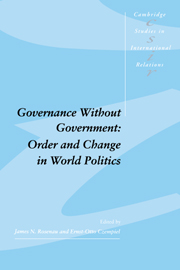Book contents
- Frontmatter
- Contents
- Notes on contributors
- Preface
- 1 Governance, order, and change in world politics
- 2 Governance without government: polyarchy in nineteenth-century European international politics
- 3 The decaying pillars of the Westphalian temple: implications for international order and governance
- 4 The “triumph” of neoclassical economics in the developing world: policy convergence and bases of governance in the international economic order
- 5 Towards a post-hegemonic conceptualization of v/orld order: reflections on the relevancy of Ibn Khaldun
- 6 The effectiveness of international institutions: hard cases and critical variables
- 7 Explaining the regulation of transnational practices: a state-building approach
- 8 “And still it moves!” State interests and social forces in the European Community
- 9 Governance and democratization
- 10 Citizenship in a changing global order
- Index
9 - Governance and democratization
Published online by Cambridge University Press: 13 October 2009
- Frontmatter
- Contents
- Notes on contributors
- Preface
- 1 Governance, order, and change in world politics
- 2 Governance without government: polyarchy in nineteenth-century European international politics
- 3 The decaying pillars of the Westphalian temple: implications for international order and governance
- 4 The “triumph” of neoclassical economics in the developing world: policy convergence and bases of governance in the international economic order
- 5 Towards a post-hegemonic conceptualization of v/orld order: reflections on the relevancy of Ibn Khaldun
- 6 The effectiveness of international institutions: hard cases and critical variables
- 7 Explaining the regulation of transnational practices: a state-building approach
- 8 “And still it moves!” State interests and social forces in the European Community
- 9 Governance and democratization
- 10 Citizenship in a changing global order
- Index
Summary
I understand “governance” to mean the capacity to get things done without the legal competence to command that they be done. Where governments, in the Eastonian sense, can distribute values authoritatively, governance can distribute them in a way which is not authoritative but equally effective. Governments exercise rule, governance uses power. From this point of view the international system is a system of governance. Conflicts are systems of governance with each party trying to induce, or to force, the other party to do certain things it otherwise would not have done. Mutual deterrence, then, was a system of governance par excellence, as was the East–West conflict as a whole. With that conflict having ended, it is instructive to ask how it was sustained. A twofold question is involved. First, how do theories of international relations treat such conflicts and how did the strategy of the North Atlantic Treaty Organization (NATO) fit these theoretical considerations? Second, viewed from the end of the Cold War, did NATO's strategy amount to successful governance? Did the West behave in such a way that its actions together with reactions of the Warsaw Pact produce an interaction favorable to the West's goals in the conflict?
These are very complex questions which cannot be answered exhaustively in this brief chapter. But in times of profound historical change it is important to look for the right questions.
- Type
- Chapter
- Information
- Governance without GovernmentOrder and Change in World Politics, pp. 250 - 271Publisher: Cambridge University PressPrint publication year: 1992
- 25
- Cited by

